What is a VPN? 8 tips on how to choose a VPN to stay safe online
Compendium of knowledge about VPNs: What are they? How do they work? Why should you use a VPN? How to pick the right one?
In this guide, I have compiled a compendium of knowledge about VPNs. I describe what VPN is and how it works. I discuss the reasons why you should use a VPN when connecting to the Internet from your computer, smartphone, or tablet. A must-read, if you want to take care of your online privacy and security.
In the following article, I have prepared a list of 8 things you should pay attention to when selecting the perfect VPN. I also prepared a personal recommendation and review of the VPN I have been using for years. You are invited to read it!
Just looking for a VPN without the time to read?
My recommendation: NordVPN.
- 5400+ servers in 59 countries
- support for 6 devices within one account
- fast performance
- no logs
- low price of $3.99 / month
… and on top of that 30-day money-back guarantee. I’ve been using it since 2016 and recommend it.
Go to the NordVPN website and receive a 60% discount >>
Despite that, I still encourage you to read the entire article ☺
- What is a VPN? How does a VPN work?
- When and why should you use a VPN?
-
How to choose a VPN? 8 issues worth checking
- 1. Data transfer limitations
- 2. The number of devices that can be connected to the VPN.
- 3. Connection speed
- 4. Does the service provider collect logs?
- 5. The country and jurisdiction of the VPN provider
- 6. How many servers does the VPN have? In how many countries?
- 7. Is there a satisfaction guarantee and a money-back policy?
- 8. Does the VPN have dedicated mobile and computer apps?
- Are VPNs paid for? How much do they cost?
- Are VPNs legal?
- Does a VPN slow down the Internet? VPN speed test
- How about setting up a VPN on a VPS server all by yourself?
- Which protocol and VPN encryption to choose?
- How to activate and use a VPN?
- Summary
What is a VPN? How does a VPN work?
VPN stands for Virtual Private Network. It is a service that encrypts all data transmitted over the Internet, thus protecting identity and providing privacy and security online.
How does a VPN work?
Let’s start from the beginning. When you use the Internet, many people can track what you do online for various reasons – your employer, your school, ISP, a criminal using a public WiFi network, a prying coffee shop owner, a service representative, a stalker, a business competitor or an untrusting husband or wife using your home network.
Anyone who has access to the network you connect to, and anyone who’s “along the way” from your computer or smartphone to the server where the site you visit is located, can access everything you do online. What’s more, in addition to stealing data and eavesdropping on your network traffic, such a person or institution can modify your network traffic at will, changing, for example, the content of the web pages you visit.
The situation looks a little better when the connection occurs via SSL, i.e. when, for example, you visit a site with a “padlock” whose address begins with https://. You may associate such a connection with, for example, bank sites, but fortunately nowadays more and more websites already offer SSL connections.
This type of connection is encrypted and unauthorized parties can see only that you’re connecting to a particular website – they will no longer be able to pry on what exactly you’re doing on it (what data you are uploading and downloading), and modify the content of a particular website in a way that could go unnoticed.
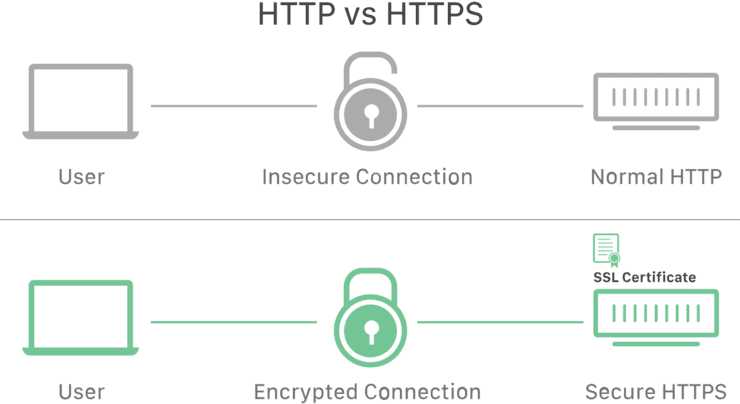
If you use a VPN connection, your entire Internet traffic passes through the remote VPN server you connect to first, changing your IP address and encrypting all the data you send and download. The entirety of the data you send and receive travels in an encrypted form to a secure VPN server first. Only then the server connects to the website or service you are using.
When connecting to a VPN, your entire online activity is encrypted and transmitted through a special tunnel. No one “along the way” can determine neither what sites you visit nor what you upload nor download online – regardless of whether the connection is encrypted using an SSL or not. This is how VPN works in practice.
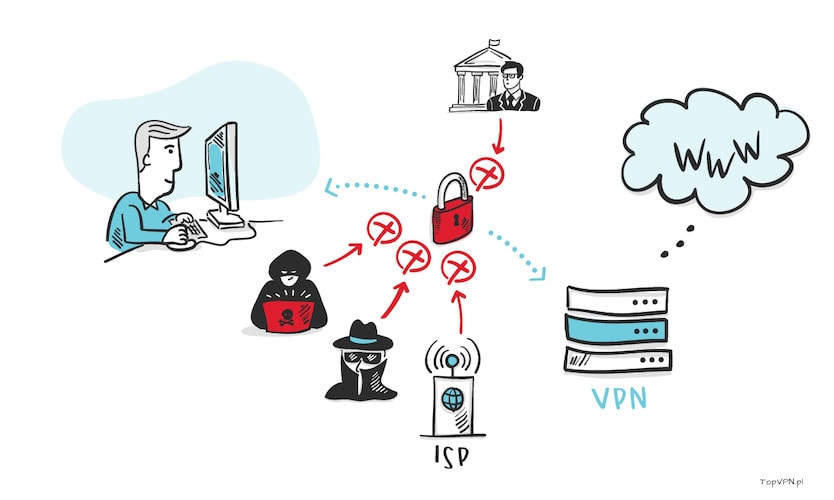
On a side note: In this article, I focus on VPN services that are offered for individual use. For security, privacy, or other purposes. The VPN service itself also includes all other private networks, e.g. those used in corporations to connect to the internal corporate network from outside the office.
When and why should you use a VPN?
All right. Now that you know what all this VPN stuff is and how it works, it’s time to move on. What does using a VPN actually accomplish? When is it worth applying one? What applications does it have? And why, in my opinion, it’s worth connecting to the internet through a VPN at all times.
Firstly: security and privacy
The first and primary reason for using VPNs is security. Thanks to the encrypted transmission of all the data you send and receive, no one is able to find out what you’re doing on your computer or smartphone.
When you’re not using a VPN your Internet Service Provider (ISP) knows everything about you. After all, he is the intermediary between you and the Internet, and every query you make is monitored, recorded, and stored for a long period.
And what data are in question?
If the connection is not encrypted in any way, all data can be logged, e.g. what sites you visit, what you write, what others write to you, what photos or videos you receive or send. Simply put, everything you do on the Internet.
In the case of encrypted traffic (HTTPS – SSL/TLS protocol), the ISP does not see the full data but is still able to learn quite a bit about you. In this case, the ISP will usually know:
- what sites you visit (DNS queries, IP addresses of websites)
- when you do it (the exact time of each connection)
- what is the size of the transferred data (e.g. downloaded or uploaded files)
- what is your IP address (after all, he assigned it to you himself)
On the other hand, in addition to ISPs, government institutions, or services, your Internet traffic can be eavesdropped by other strangers.
When using public, free WiFi networks (e.g. in a hotel, airport, pub, train or restaurant), you never know who else may have access to the network in question. And when he or she has access to the same network, they may also have access to all unencrypted traffic within it.
Eavesdropping on all traffic and monitoring what you do on the Internet is one thing. The other is manipulation or the modification of traffic. All unencrypted traffic on such a network can be modified at will, for example, by swapping photos, inserting malicious JavaScript code into a website, swapping software downloads, or redirecting you to a fake website.
The same situation also applies to all Internet networks (WiFi and “wired”) that you do not own. We’re talking about your employer’s corporate networks (who can check what his employees are doing while they’re at work), school or college networks or, for example, WiFi in a library or office.
Against all such attacks and breaches, you are protected by using a VPN, which encrypts all Internet traffic. If your connection is protected by a VPN, the only thing a network provider, employer, school, government, service, or another outsider will know is that you are using a VPN. Nothing else.
Hiding your browsing history (ISP data sale)
Remember how I wrote about ISPs collecting data about what you do online? It’s one thing for ISPs to store, analyze and use it, but there’s a second issue I’d like to write to you about today.
ISPs collect a lot of data that can be very valuable to certain people and institutions. I’m writing here about advertisers, or rather advertising networks or data brokers, who buy and collect the information about the behavior of Internet users, including logs from visited sites from various places. For them, the data from your ISP is a tasty morsel, and for the ISP it is simply an additional source of earnings.
And although the data is usually delivered to the brokers in anonymized form (without personal data of specific Internet users such as names and surnames), it is possible to deduce quite a lot about a specific Internet user by his IP address, behavioral patterns, and visited sites. And thanks to this, ultimately perfectly tailor the advertisements to sell you products, services, or, for example, political ideas in an efficient way.
However, Internet providers are not the only entities that collect data about who visits what sites and what they do online.
Another player in the market of collecting and using your data are website owners, who willingly (and automatically – through scripts) share this information with advertising networks.
Information about who visits a site (and what IP address they have) is valuable. Thanks to IP addresses (but also cookies), among other things, site and blog owners know how many readers/visitors they have and what content is most popular.
There’s nothing wrong with that, but some people may want to be more protective of their privacy and stop sharing their unique IP addresses with site owners, data brokers, and ad networks. Especially in the case of websites that… well, at times, we simply want to remain anonymous.
And it doesn’t help here to use incognito mode in the browser, which doesn’t save our history on the device, but in no way hides our actual IP address.
Using a VPN hides your actual IP address. When you connect to a VPN you are visible to everyone (advertisers, networks, site owners, etc.), as the public IP address of a VPN service, shared with many other people. You often connect to a different VPN server each time, so your IP changes. Likewise, you can change the country you connect to. Click… and your IP is from Switzerland or Luxembourg.
Secondly: bypassing censorship
If you don’t live in or travel to countries such as China, Russia, Belarus, South Korea, India, or Saudi Arabia, for example, you can use the global surface web without much trouble.
It’s true, that if you download or watch your favorite series (which is not available on any VOD service) on a not-so-legal site, it may happen that one day it will disappear. Along with your dozen or so dollars that you paid for a premium account on a “warez” site. Well, but that’s normal. Fighting piracy or removing websites that break the law in one way or another is not the same as permanent censorship of the web.
However, if you are going on a foreign trip to a place where the laws are not as liberal as in your country, you have to reckon with the fact that a smaller or larger part of the “Western Internet” may not be accessible without using a VPN.
Take, for example, China, which is at the forefront of Internet censorship. Upon arriving in the Middle Kingdom, you may be surprised to find that China’s Great Firewall blocks most sites and services you know, making it virtually impossible to use the Internet.
What sites/services/apps are blocked in China? The most popular ones are:
- Google services – including Google Maps (Maps), Google Docs (Docs), Google Translate (Translator), or Google Drive (Drive)
- Social media – including Facebook and Messenger, YouTube, Instagram, WhatsApp, Twitter, and Pinterest
- Foreign media – including BBC, Bloomberg, New York Times, Wall Street Journal or Reuters
- Work tools – including Dropbox, Slack, and GitHub

The only way to have full access to all these services is to use a proven VPN service that also ensures operation in China. So when choosing a VPN provider, keep in mind, however, that not all providers operate in the People’s Republic of China. However, more on that later.
What is worth remembering is that every country has its regulations and its own idea of censoring the Internet to some extent, and in the vast majority of cases a VPN, allows such censorship to be bypassed completely.
Thirdly: bypassing region locks
Another big advantage of connecting to the network using a VPN is the ability to bypass regional lockouts. Let me explain what this is all about.
There are lots of VOD (video on demand) and online TV services available in different countries
However, not always, not everywhere, and not for everyone
VOD services apply regional blocking, or so-called geo-blocking, which restricts the ability to watch material to a particular country or territory. This is related to licensing issues for video content. Typically, a VOD operator purchases a license of a movie or series for selected countries. The license may also apply separately to subtitles or voiceover.
The upshot of this is that when you want to watch your favorite TV series or web TV on a foreign trip, you may be disappointed because all you will see is a message such as this:
When using Netflix abroad, you may not be able to see your favorite series you are watching. Or once the series becomes available, you won’t be able to watch it with subtitles or a voiceover in your language of choice. However, this is where a VPN comes to the rescue.
Using a VPN, we can choose the country we want to connect to. After connecting, we receive the IP address of the country of choice, which makes us visible to all websites, services, and applications as if we were at the chosen location. As a result, we will be able to watch programs, movies, and TV series as if we were in the selected country.
It is also worth mentioning Netflix, which offers a much larger range of series and movies for its customers residing in the US. Quite a few people use VPNs not to be safer or to protect their privacy, but precisely in order to unlock unlimited access to Netflix’s offerings or other American or global VOD services by connecting to VPN servers in the United States.
So it’s worth using a VPN if you want to:
- watch regional TV or VOD while abroad (without regional blocking)
- watch Netflix abroad with subtitles or voiceover in your language of choice
- unblock access to foreign VOD services (e.g. Netflix USA, Disney+, HBO Max, Hulu)
Fourthly: special tasks (gamers, streamers, torrents, and more).
Here I’ll just briefly describe to you other useful reasons and situations where a VPN can be a really useful solution. Reasons related to privacy, anonymity, and security, but not only. What is the special task?
A VPN will keep you safe from DDoS (distributed denial of service) attacks to which you may be vulnerable. The attack involves your IP address being attacked simultaneously from many different places on the network (e.g., seized devices, botnets), causing your hardware (router/computer) to stop responding to requests. The result: the inability to use your computer or the Internet normally.
Nowadays, almost anyone can fall victim to this type of attack, which unfortunately often proves to be very effective. DDoS attacks are relatively easy to execute and fairly inexpensive to outsource to people who specialize in this (costing from about a few to a few dozen dollars).
A group of people who particularly often fall victim to this type of attack is gamers and streamers. If you take part in online competitions in Counter-Strike: Global Offensive (CS: GO), League of Legends (LoL), World of Warcraft (WoW), or other games, or stream your struggles in Apex Legends or Fortnite then sooner or later you may become the target of an attack by game opponents, competing streamers or simply other jealous individuals.
Where there is money (from streaming, prizes, and the sale of game items), there are also various attempted attacks. Including DDoS, which results in the lack of normal Internet access, resulting in being “kicked out” of a game or a video stream.
Since using a VPN hides your real IP address, the only thing that can be attacked is the IP address of one of the VPN provider’s servers. And as you probably know, you’re one click away from changing your current server to another one of your choosing. And there goes the problem.
Changing your IP address with a VPN is also an opportunity to unblock services not available in your country. Often specific offers or promotions are only available to residents of a particular country. This includes, for example, Internet service offers and releases of games and other products.
Another situation in which using a VPN is strongly recommended is the use of P2P (peer-to-peer) networks such as torrents.
Torrent and P2P networks work on the principle of you downloading various files such as programs, movies, TV series, and music from other Internet users while sharing with others the files you have already downloaded. Unfortunately, these files are not always under open free licenses – they are often copyrighted.
And if we are talking about sharing with others (and that’s how torrents work) movies, series, games, e-books, or software, then unfortunately we have a copyright infringement, which is often prosecuted by the creators, or specialized companies.
By default, when using torrents, everyone can see all the IP addresses of the computers that download and upload the file. This includes copyright holders, who often automatically collect such information to send demands for payment later. By hiding one’s real IP behind a VPN, which does not save logs that can be shared with such companies or services – the problem disappears.
I must mention here that not every VPN service provider, torrents, or P2P network is welcome. Some outright prohibit the use, limit bandwidth, or block torrents within their network. Other providers offer a special pool of IP addresses dedicated to P2P services. If you use torrents/P2P, it’s a good idea to make sure the VPN accepts them before choosing it.
There are many more such “special” applications of VPNs. It’s impossible to describe them all, and that’s not the purpose of this guide either. I simply wanted to show you what (besides security and privacy issues) using a VPN can still be useful for.
In summary, if you use a VPN (which I encourage you to do!) then:
- Your Internet Service Provider (ISP), employer, or school won’t know what you’re doing on your computer or smartphone
- Websites won’t know your real IP address
- Cybercriminals will not pry into your traffic
- You will bypass internet censorship
- You will unblock Netflix and bypass geolocation on other TV and VOD services
- You will protect yourself from DDoS attacks if you are a gamer and/or streamer
- You will be able to use Torrents and P2P networks anonymously
How to choose a VPN? 8 issues worth checking
You already know what a VPN is and how it works. But how do you choose the best one? Which should you choose? Below I’ve compiled the 8 most important issues to consider when looking for a VPN.
1. Data transfer limitations
The most important issue that you need to pay attention to is the possible limits on the amount of data transferred with a VPN.
Netflix, YouTube, or Spotify – each of these services can download a lot of data during regular use. Example below.
How much data do you download when watching a movie on Netflix?
- 0.7 GB per hour in medium quality
- 3 GB per hour in HD quality
- 7 GB per hour in Ultra UD quality
Plus all the websites you visit, instant messengers on which you regularly send and receive photos, images, and GIFs, system updates, syncing photos to the cloud, Dropbox, and all the services running in the background.
When choosing a VPN service provider, pay attention to whether it has any data transfer limits. It’s always better to choose a VPN with no data transfer limit rather than the one with the biggest gigabyte package.
2. The number of devices that can be connected to the VPN.
An important factor in choosing a service provider that will provide you with a VPN is the maximum number of devices that can be connected to the VPN service at the same time. Your laptop, smartphone, smart TV, and devices of other household members. Anything you can hook up to the Internet, you can connect to the Web using a VPN.
It’s a good idea to make sure that we will be able to use the service on all the devices in our household before ordering it. Usually, service providers offer this for max. 2-5 devices. I believe that 5-6 devices are the bare minimum at a time when we are starting to gradually connect our coffee makers and vacuum cleaners to the Web, and take loads of electronic devices on trips.
Such a limitation can be circumvented by setting up a VPN connection on our home router – then everyone within our Wi-Fi network will connect to the VPN, which will treat this as just one “shared” connection. But that always leaves the issue of using a VPN outside the home, where each device connects separately to the carrier’s network via 3G/4G/LTE or soon enough – the 5G
3. Connection speed
Does using a VPN slow down the Internet? Unfortunately, it does sometimes. Therefore, when looking for the best VPN, it’s a good idea to make sure that the service provider doesn’t limit the transfer speed in any way.
Typically, the download and upload speeds while connected to a VPN depend on the load on the server in question. There may be hundreds or thousands of servers themselves, but if you happen to connect to one that is overloaded by other users, you have to expect a drop in Internet speed.
When choosing a VPN, it’s worth making sure that the service provider doesn’t significantly limit the speed for each user, and that he has a sufficient number of servers so that if our slows down, we can connect to another one. You can test your Internet speed using SpeedTest.net or Fast.com by Netflix.
4. Does the service provider collect logs?
A thing to consider when it comes to privacy is that the VPN provider should not collect logs. What does this mean?
Some service providers that provide VPNs – like all Internet providers – log information about what we do while we are connected to the Net. They log information about what sites we visit, what we upload and download, and, along with the date and time, record this in so-called logs, which they can then sell to advertising companies or make available to various authorized services upon request.
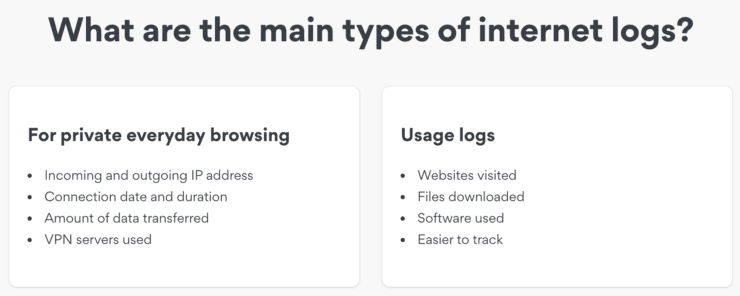
If you’re concerned about privacy and are looking for a VPN without logs, take a peek at the provider’s website and make sure it clearly states in its privacy policy that it doesn’t collect any information about users’ connections (the so-called No log policy). You can also look online for information about that particular provider in the context of log collection. Often, a singular collaboration with the authorities can permanently ruin the VPN’s reputation, as long as it has previously declared a “no logs” policy.
5. The country and jurisdiction of the VPN provider
In the previous section, I wrote about Internet activity logs that can be disclosed to the authorities. So the next element to pay attention to will be the country in which the VPN provider is registered and the jurisdiction it is subject to.
Example: If the company offering the VPN is registered in the US or in a state that cooperates with it, we can be confident that the US government agencies (NSA, FBI, CIA, and other menacing three-letter acronyms) can have full access to the logs and network activity of any of the VPN’s clients.
The authorities can gain full access even if a company declares that it does not collect logs on users. As the history of similar cases shows, it is always possible to force (e.g. with a court warrant a VPN provider to cooperate and start collecting logs for a particular user.
So it’s worth choosing a provider operating within a jurisdiction that will ensure full anonymity and privacy. Such countries where VPNs are often located include Panama, Seychelles, the British Virgin Islands, and Switzerland.
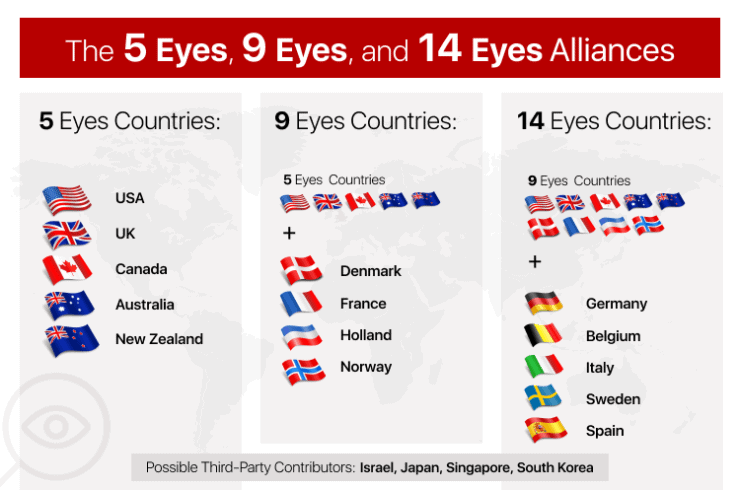
6. How many servers does the VPN have? In how many countries?
The infrastructure of VPN providers is based upon hundreds and thousands of servers scattered in various countries, on different continents around the world. It is through these servers that we connect to the Internet using a VPN.
When searching for the perfect VPN, it’s worth checking the company’s website to see how many servers it offers and in which countries they are located.
In addition to servers in your country (which need to be provided), it’s worth noting whether servers in the US and European Union countries appear on the list. Well, and others depend on your needs. There are providers that offer over 5,000 servers, which are distributed in 60 countries on 5 continents. Full range of choices.
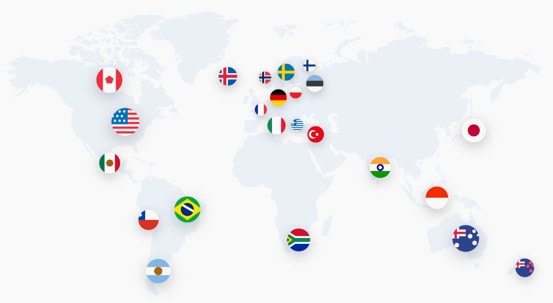
It is also a good idea to find out how many servers are located in the country you are interested in. The rule is simple – the more, the better. Especially if the VPN in question is popular and is used by lots of people at the same time. After all, we don’t want the use of VPN to cause our Internet speed to slow down drastically.
7. Is there a satisfaction guarantee and a money-back policy?
In e-commerce, we’ve grown accustomed as consumers to being able to cancel a contract made over the Internet. We order the goods, check them at home and send them back when we change our minds or aren’t fond of something.
VPN companies, however, are not required to offer a money-back guarantee or the ability to cancel the contract. Firstly, because they are usually not based in the European Union, where such laws apply (and that’s a good thing!). And secondly, due to VPN not being an ordinary commodity, but a service that we start using immediately after purchase.
Nonetheless, companies fighting for the customer have started to offer the possibility to check the quality of the services offered in a safe and stress-free way. So when looking for the best VPN, pay attention to whether a satisfaction guarantee is offered, which will allow you to cancel the service if for some reason you are not satisfied.

In my opinion, the minimum is a 7 days refund policy. Companies that are more confident in their services offer a 30-day period in which they guarantee a 100% refund. If you contact the company offering the VPN within this period, it should, without asking for details or reasons, refund all your money.
8. Does the VPN have dedicated mobile and computer apps?
Convenience will also be an important issue to look into before making the final purchase decision. More specifically, the applications offered by the VPN provider.
Check whether your prospective VPN offers apps for all the platforms you will use in the future. Apps for Windows, macOS, or Linux operating systems, and for Android and iOS mobile systems (that is, the system that supports the iPhone, iPad, and other Apple products).
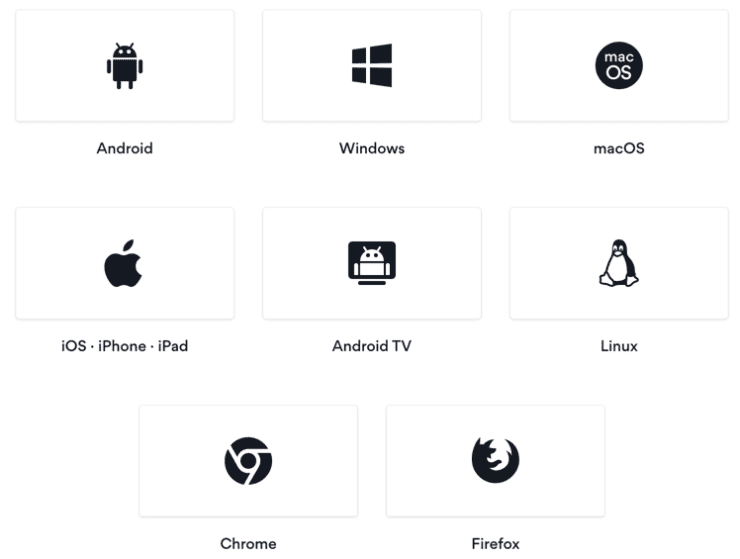
It’s important that the app is convenient and as foolproof as possible. This is especially important if you will be sharing the VPN with the less tech-savvy part of the family.
Once you’ve made sure that a particular VPN has all the apps you need, pay attention to the ratings and reviews in the Google Play and App Stores. A small number of ratings, or a fair amount of unflattering reviews, can indicate that a particular VPN may prove to be troublesome in the future.
Are VPNs paid for? How much do they cost?
Before I even get to my choice and recommend the VPN I use, a few more words about the so-called free VPNs.
On the Internet, you may sometimes come across offers labeled “free VPN” or “VPN for free.” Don’t be fooled by them, and remember an important rule:
“If you don’t pay for the product, you are the product”
Creating and maintaining a service with servers through which all Internet traffic is tunneled is laborious and expensive. Why would anyone offer to do it for free?
Free VPNs can:
- limit transfer to, say, 500 MB per month
- offer only a few, very slow and clogged servers
- display ads and “insert” them into the websites you visit
- monitor all your Internet traffic and use it for various purposes
- resell information about your online activity (visited Web sites, etc.) to others
- add redirects with affiliate links to the stores and sites you visit
You may still encounter free browser extensions advertised as VPNs (such as Opera VPN or plug-ins for Chrome or Firefox). In practice, however, these are more or less effective proxy-type services that only work on a particular browser on your computer, without covering your other connections on your computer, tablet, phone, or any other device.
Often these types of services and apps are designed to sell you a dubious quality, paid VPN service as quickly as possible when the limits become more annoying or the free VPN simply stops working.
So if you’re interested in an ad-free, limit-free VPN that cares about your privacy, it’s better to reach into your wallet and become a discerning customer of a professional service instead of being an easy target for scammers.
How much does a VPN cost? VPN services usually cost between £10 and £50 per month when purchased a year in advance.
Is that a lot? You decide.
Are VPNs legal?
In most countries around the world, the use of a VPN is fully legal.
However, there are countries where VPN use is considered illegal (Belarus, Iraq, North Korea, Turkmenistan) or partially illegal (China, Iran, Oman, Russia, Turkey, United Arab Emirates).
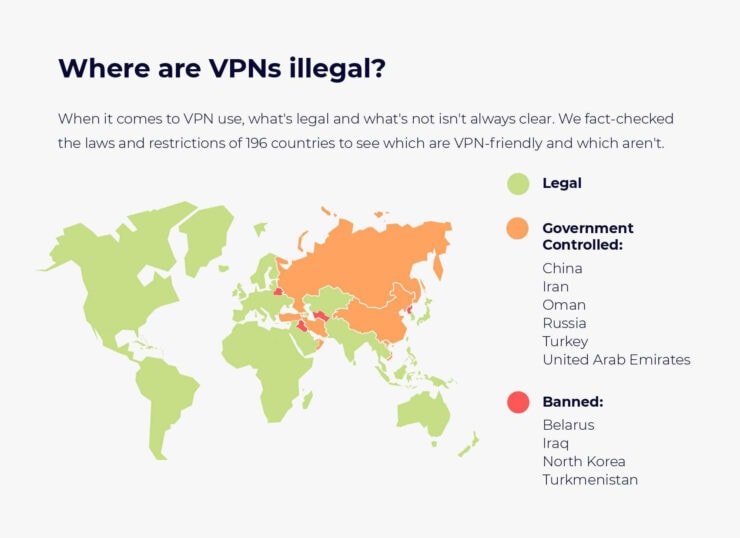
Fortunately, in most countries, you can use VPN services free of doubt, as they are perfectly legal.. Just like encrypting your conversations or hard drive, encrypting your Internet connection has nothing to do with breaking the law.
Does a VPN slow down the Internet? VPN speed test
On the Internet you may, admittedly, come across information that someone’s use of a VPN has made the Internet faster, but these are rare cases and only occur if your ISP/operator applies specific restrictions.
But to answer directly: yes, VPN slows down the internet in most cases and reduces download and upload speeds, although only slightly. Though only slightly. A good VPN with efficient servers should not reduce bandwidth by more than 10-20%.
I’m not going to run any complicated tests, because this isn’t the place for that, but I did a quick check of what the Internet connection speed looks like without a VPN running and after a while with a VPN.
On my home internet connection
Without VPN:

Download: 68.78 Mbps
Upload: 57.64 Mbps
With VPN:

Download: 64.84 Mbps (-6%)
Upload: 54.11 Mbps (-6%)
On a telecom carrier’s LTE connection
Without VPN:

Download: 71.53 Mbps
Upload: 17.84 Mbps
With VPN:

Download: 93.43 Mbps (+31%)
Upload: 15.74 Mbps (-12%)
Admittedly, these tests are in no way definite but serve as a mere glance at what you can expect when using a VPN under ” normal” everyday conditions. Especially on a home connection, which is more stable.
How about setting up a VPN on a VPS server all by yourself?
If you have enough time and technical know-how, you may be tempted to set up a VPN service just for yourself. All you will need is to buy a VPS somewhere, which you will then configure, secure, and take care of in terms of updates.
You’ll find quite a few tutorials online that will show you how to set up a server yourself and run a VPN service using open-source solutions such as OpenVPN or Wireguard.
The pros of such a solution are:
- full control over the server you connect to (you don’t have to put your trust in the VPN provider)
- lack of any limits (if your server provider does not impose such)
However, this solution has several downsides:
- requires technical expertise to not only run the VPN but also properly secure the server
- requires dedicating time to installation and subsequent maintenance of the service (updates, etc.)
- single server, with one location and one IP address (pointing to you as the server owner)
The monthly rental of a VPS server will usually cost about the same as a professional VPN service ($3-15 / mo), so if you do not count the cost of time, then price-wise it will turn out the same.
Would I recommend such a solution? You have to decide for yourself. If you care exclusively about security and not necessarily anonymity, and you are able to devote time and enjoy having everything configured by yourself – it may be a good idea.
Myself, despite a few experiments with a self-hosted VPN, I decided that for my applications a commercial service would work better.
Which protocol and VPN encryption to choose?
Although all VPN services have the same operating principle, “underneath” they use different algorithms to encrypt data and use different methods (protocols) to connect to the Internet. Below is a quick overview of the most popular solutions.
In terms of encryption, the matter is simple: most VPNs are encrypted using AES-128, AES-256, Blowfish-128, or Blowfish-256 algorithms. The higher the number in the name (the number of bits), the stronger and more secure the encryption, so it is better to opt for 256-bit AES-256 or Blowfish-256 encryption.
As for the protocols, the 3 most popular ones in VPN services are:
- OpenVPN – a widely known, well-tested, popular open source protocol. It works on virtually any hardware.
- IPSec/IKEv2 – also a well-known, secure, and tested protocol. However, it may not work on some hardware running older or unsupported software.
- Wireguard – a less-known, new protocol. Not as time-proven as OpenVPN, but very fast, efficient, and less resource-consuming. Few VPN services offer it as of now.
Any of the above would be a good and secure choice as of today. On mobile devices, I use the Wireguard protocol, which consumes my battery significantly less compared to the others.
On VPN sites you may also come across protocols such as WL2TP/IPSec or PPTP. These are protocols that are no longer considered secure today, and their use is not recommended. They are usually maintained because of backward compatibility and older devices that still use them.
Some services offer only 1-2 protocols, while others give you a wider selection.
How to activate and use a VPN?
At first, I planned to prepare detailed instructions here, showing how to start a VPN connection step by step, how to change IPs, and how to use VPN services. However, I decided that such an instruction will be mostly unnecessary in most cases…
1. Choose a VPN provider
First of all, you need to decide on the offer of any of the VPN providers. I use and recommend NordVPN, but you can find a lot of offers from other providers (here is a sample comparison). Earlier I have listed 8 things to pay attention to when making your choice.
2. Buy a VPN service from the website
Once you’ve made up your mind, purchase the service. Often, the longer you subscribe to the VPN service by paying upfront, the less you will pay monthly for its use. Remember, too, that reputable VPN services offer, for example, a 30-day money-back guarantee.
3. Download programs and apps for your devices
Use the VPN’s official website to download software for your computer and mobile devices. A good VPN provider offers dedicated programs for Windows, macOS, and Linux devices, as well as apps for iOS and Android. Using official apps and programs (downloaded from the manufacturer’s website), we don’t have to play around with connection configurations on our operating system, plus we gain access to additional options. This is the simplest and most convenient solution.
4. Log in and connect to the VPN
To change the IP address and connect to the VPN, all we need to do is enter the email address and password we received from the service provider. After entering these details, most programs and applications show a list of servers (countries) that we can connect to. All you have to do is select one of them and click… done 🙂
You can use the VPN whenever you want, connecting to whatever servers you want. The fastest connection will usually be with servers in the countries that are closest to you. You can change the country you connect to at any time.
You can use the VPN on multiple devices simultaneously (the maximum number is determined by the VPN provider). Having a higher limit, it’s worth installing it on your loved ones’ phones or computers as well.
You can use a VPN connection practically all the time, or only when using an untrusted network – the choice is yours.
Summary
VPN is, in my opinion, right next to a password manager and antivirus, one of the online security and privacy tools worth reaching for. I use a VPN service daily when connecting to the Internet, regardless of my device and location.
Will a VPN solve all online security problems? Certainly not, but it is a good tool in the arsenal of a person who wants to keep himself and his loved ones safe.